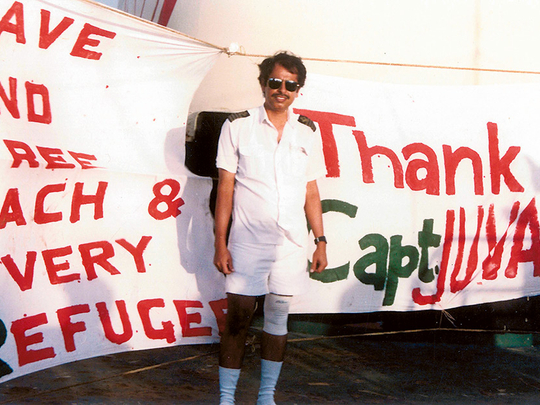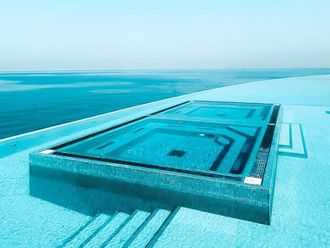
Dubai: The former captain of a cargo ship, which rescued hundreds of stranded Indians during the Iraq invasion of Kuwait, still finds it hard to control his emotions as he reminisces about the nightmare on its 26th anniversary.
Captain Zain Abidin Juvale, now aged 64, was skipper of the Panama-registered cargo ship MV Safeer, which sailed into Port Shuwaikh in Kuwait on July 31, 1990. What should have been a routine voyage suddenly turned into a nightmare when Saddam Hussain’s Iraq invaded Kuwait on August 2, 1990. Captain Juvale and his crew were taken hostage on August 3, 1990. It took artful negotiation by Captain Juvale to not only secure his crew’s freedom, but evacuate more than 700 stranded Indian expatriates who had taken refuge at the Indian consulate in Kuwait.
On September 4, 1990, they set sail to the UAE after 35 days in captivity and reached Port Rashid in Dubai on September 6, 1990. The next day, the ship was accorded a full navy salute, a rare honour for a merchant navy vessel.
Captain Zain Abidin Juvale and his 25-member crew were taken hostage on August 3, 1990. Courtesy: Captain Zain Abidin Juvale
In Dubai to visit his sons last week, Captain Juvale who now lives in Auckland, New Zealand, revisited the heroic effort in an exclusive interview with Gulf News.
He is yet to overcome the trauma. The eyes of this unsung hero become moist as he narrates the events of August 1990.
“Our ship was carrying approximately 5,000 tonnes of rice for export to Kuwait. We docked at the port only to find it completely deserted. It was only when we tuned in to the BBC Radio that we realised we had sailed into a captured port. Several armed young men in army fatigues ordered us to disembark. Hands over our heads, 26 of us that constituted the crew, walked down. A double barrel gun was aimed two inches from our foreheads and to this day I cannot forget the terror I felt. Our families, or the Indian government, did not know we were in the port, our death could have gone unnoticed for days. All of us immediately thought of our wives and children back home.”
Art of negotiation
The cargo ship MV Safeer docked in Kuwait’s Port Shuwaikh on July 31, 1990, carrying approximately 5,000 tonnes of rice. Courtesy: Captain Zain Abidin Juvale
Fortunately, the soldiers did not shoot and eventually offered them water and cigarettes “That was the first sign that these soldiers had a humane side,” he said.
In the course of a week, Captain Juvale was able to establish a rapport with his captors, many of whom were just 14-year-old boys. He got the imprisoned cooks of the ship released and agreed to prepare meals for eveyone. “In the bargain I began getting fresh fruits, vegetables and cereals that I was able to secretly store in our freezers as I had to think of ingenious ways to survive and plan an escape,” he said.
During trips to the port offices to retrieve passports lying strewn at the immigration office and other places looted by the Iraqi soldiers, Captain Juvale chanced upon a small room with a phone. He locked the room and pocketed the keys. “After that every night I would walk in the darkness in the August heat, get into the room and dial the Indian embassy number in the city.”
Eventually during the then Indian external affairs minister I.K. Gujral’s visit, Captain Juvale was able to connect to the embassy after trying for a week. “No one knew of a ship and its crew being trapped at the port . The next day the embassy sent officials to fetch me at the port. I was able to successfully convince them and offer to take all the stranded Indians with us. There were roughly 3,000 Indians and I got back to preparing the cargo ship to carry so many passengers.”
Toilets had to be constructed, seating and rest areas had to be created and food had to be stored. So after managing to dispose off the rice cargo, he began this work in right earnest, involving the crew of other ships stranded at the port.
“The Iraqi soldiers who saw me working to rescue others somehow respected me for it and allowed me access various areas of the port,” he recalled.
Minor setback
Captain Juvale with the huge big thank you note signed by all the 700-plus people on board MV Safeer. Courtesy: Captain Zain Abidin Juvale
Eventually, because of the risk involved in rescuing so many, the Indian Navy forbade him to take up this project. “This was a blow as I had people begging me to take them out, promising me cars, money and expensive gifts. There were people on wheel chairs, expectant mothers, I realised I had to rescue these people at my own risk and continued working to prepare the ship. I decided to take only as many people as I could provide life jackets and rescue boats for,” recalled Captain Juvale who managed to secure over 700 life jackets and 14 rescue boats. He also made sure he chose people solely on their need and situation without any cultural or regional bias. “I was working with the leaders of the teams that were formed and they were shortlisting the people who would sail with me,” he explained.
Eventually with a naval escort and fear of underwater mines hanging over his head, Captain Juvale with his 26 crew and over 700 refugees sailed out of Port Shuwaikh on September 4.
In Dubai to visit his sons last week, Captain Zain Abidin Juvale, 64, who now lives in Auckland, New Zealand, revisited the heroic effort in an exclusive interview with Gulf News. Arshad Ali/Gulf News
“All this while I had no communication with my wife or my sons. I was working with the single minded mission of getting these people out. The moment we sailed out of the port and the Kuwaiti waters, I had a message ready giving full details of the ship and the passengers that was radioed out to the top news channels around the world – BBC, VOA, Indian External Affairs Ministry. For eight hours we had no incident and complete radio silence. Then we suddenly found a helicopter hovering over the ship and were gripped by fear. It turned out to be a helicopter deployed by the BBC media team sent out to cover the event. Inside the passengers were jubilant. It was quite warm but no one was complaining. We had organised food, milk, water. In three days we sailed into Port Rashid with the Dubai Naval ships standing in a row to welcome us as a mark of respect. This was a first in the world that naval ships were extending this honour to a cargo ship My organisation’s chairman Capt Ebrahim Modak had arranged milk, tea and snacks for the passengers who disembarked in Dubai with tears of joy and relief. Of the 7-8 women who were pregnant, at least one of driven straight to the maternity ward where she delivered. Most passengers rescued flew out to Indian within four hours of arriving at Rashid Port,” Captain Juvale recalled.
No acknowledgement
His act of bravery that required considerable resourcefulness and presence of mind was never acknowledged by the Indian government. But 700 plus people on board MV Safeer signed a big thank you note for Captain Juvale.
“That is my biggest reward,” said Captain Juvale who added that he was upset by a recent Bollywood film based on the Kuwait rescue that focussed on a fictional character loosely based on one of the Indians who had played a small role in the rescue. “It is sad that the Indian authorities never acknowledged this rescue although the world media covered it. But I had so many calls and letters from people who were on MV Safeer on that journey with me who thanked me. It was one of the greatest journeys of my life and I am satisfied that I was able to fulfil this mission.”








